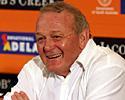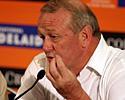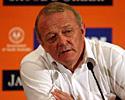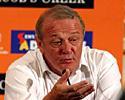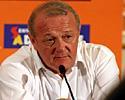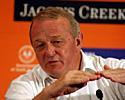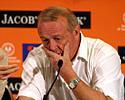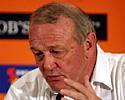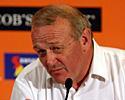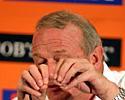
 |
 |
 |
 |
 |
 |
 |
7th Jacob's Creek Tour Down Under - 2.HC
Australia, January 18-23, 2005
News for January 25, 2005
Leblanc happy Down Under, but remains distant on Pro Tour expansion
By Gerard Knapp
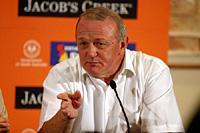
|
As the special invited guest to the Jacob's Creek Tour Down Under, the race director of the world's biggest bike race, Jean-Marie Leblanc of the Tour de France, came away impressed with the Australian stage race.
At a press conference in Adelaide prior to the start of stage 6 of the JCTDU, Leblanc praised the standard of race organisation, climate, environment and the racing. He said it was "possible" that in four or five years an event outside Europe - like the JCTDU - could even become part of the ProTour.
Leblanc said he would encourage other European teams to participate at the JCTDU in the future. The race was "the best solution to enter the season" and Australia is "a fabulous area to train" prior to the season start.
It was high praise indeed, given his employer, the Amaury Sport Organisation (ASO), also helps to run the Tour of Qatar, a similar style of stage race that is held from January 31 to February 4 in the Middle East nation.
Competition is strong among non-European nations to have their events accepted as being equal to those held in France, Italy or Spain, so Leblanc's approval was readily reported by the Australian media.
Overall, this year's JCTDU was raced harder than ever (almost all stages finished ahead of schedule) and its acceptance in South Australia continues, with growing crowds along the race route. It is building momentum to the extent that the local media are running 'scare stories' that the government - which underwrites the race - needs to be careful it's not 'stolen' by a rival Australian state.
(Previously, the South Australian State Government underwrote the first Formula 1 race held in Australia. It became such a huge success that it was lost to an aggressive counter-bid from neighbouring Victoria. It still haunts them.)
Harder to move than F1
The TdF figurehead was also asked questions about the UCI's new ProTour, a concept that did not win ready acceptance at ASO and indeed, it could still be seen as being somewhat lukewarm on the concept.
While Leblanc did say that "the ProTour does have to make cycling international", he stopped short of endorsing the view that the ProTour needed to include events in Australia, North America and Asia to be a successful, global operation.
Admittedly, Leblanc could not answer on behalf of the UCI, which has developed the concept. However, he believed there were factors such as the cost of moving the teams of riders, equipment and personnel and the "jetlag" to consider. "Cycling is very much a European sport," he said.
Leblanc seemed reserved on the 'globalisation' of cycling, pointing to logistical problems of taking 20 ProTour teams outside Europe. Indeed, he believed it was a greater challenge than shifting the Formula 1 infrastructure from country to country. Cycling "is more of a problem", again because of the jetlag and the congested nature of the racing schedule, where events are only days apart.
While Leblanc took questions in English, he answered the more complex, political questions in French, with visiting Scottish journalist Justin Davis of AFP providing the translation. One French journalist present - who does speak some English - chose to converse in French with his countryman, temporarily excluding the assembled Australian media from proceedings.
But from what could be determined, it appears that Leblanc was convinced there were near-insurmountable logistical problems to expand the ProTour beyond Europe.
Some encouragement
It would appear a more realistic outcome - given the Euro-centric nature of the ProTour - is for the JCTDU to grow in importance.
To increase its stature, Leblanc said that the JCTDU would require a minimum of 12 ProTour teams and that race director Mike Turtur said it was possible "they could go to (a total of) 14 to 15 teams" in the future.
The race organisation "didn't need much advice, they seem very professional. A few details could be improved," he said. Having more than one climb per day "could improve that classification".
But overall, he was impressed with the standard of the racing and organisation. He also acknowledged how the organizers spent "a lot of money" to pay for the transport, accommodation and support of the 12 teams in this year's race, of which seven are part of the ProTour. The other five were made up of 'Continental-Professsional' (division 2) and national composite teams.
Of those composite teams, UniSA (sponsored by the University of South Australia) was one of the most animated in the race and its leader, Gene Bates, took home the mountains jersey and finished 11th on GC. Leblanc said at first he was unaware UniSA was not a professional team, such was its aggressive approach to the race. Bates, meanwhile, headed off to Italy after the JCTDU to race for the Zalf squad this year.
Asked the inevitable question about the standard of Australian cycling, Leblanc said if the Tour de France was organized along national lines then "Australia would have one of the strongest teams", pointing to riders such as Mick Rogers, Robbie McEwen and Stuart O'Grady already being some of the Tour's major riders.
"Probably the best (chance on GC in the Tour) seems to be Michael Rogers. He's good in the time trial, rather good in the mountains and he could be on the podium of the Champs Elysées; maybe this year, maybe in a couple of years," he said.
Kangaroos in Europe
Leblanc repeated earlier statements given in an interview to AFP's Davis that Australian cyclists are like "pioneers" and that they were seen as "warriors" of the road in France.
"The 'Kangaroos'," he said with a smile, "are considered like pioneers, and when they come to Europe with one bicycle and two baggage they are supposed to be very motivated, and they are. They look like warriors, they are strong, they are motivated, they are hard, the reason for which they succeed."
That may be the case for those amateurs looking for a ride with a small pro team or not part of a government-funded development program, but in this year's TdF, at least three ProTour squads will have Australians as team leaders for the general classification.
The comments seem more applicable to 1985 than 2005. The reality is that most Australian riders on pro teams take their monogrammed suitcases - courtesy of their pro teams - and leave the bikes to the mechanics. Leblanc also offered the observation that "cycling is a new sport in Australia"; which could be interpreted to mean there is a growing interest in road cycling, as he did point to the "older men and young boys with bicycles" he had seen while out on the course.
But to say that it is a "new sport" defies cycling's long traditions outside Europe. In Australia, cycling may not enjoy the profile it does in Europe and ranks behind the big ball sports, but the Melbourne to Warrnambool is said to be the world's oldest one day road race, and the country has held track cycling events dating back to the 19th century.
Still, Leblanc's comments were warmly received as another positive step towards elevating the sport's profile in Australia. And it may not need the introduction of super-sonic airliners for the ProTour - if indeed it lasts beyond UCI president Hein Verbruggen's tenure - to extend beyond Europe.
Also see: Jean-Marie gets to know the locals
'Team Davis' brings Queensland support down south
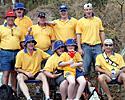
|
When brothers Allan and Scott Davis found themselves racing on different professional teams, the family support base was in a dilemma - should they wear the colours of one team or the other? The results was to create 'Team Davis', complete with monogrammed bright yellow polo shirts.
This year, both Davis brothers were riding in the Jacob's Creek Tour Down Under; Allan is one of the star riders of Liberty Seguros, while his brother Scott is with Tenax in Europe but was riding in the JCTDU for the composite United Water squad, until he became ill with a stomach problem and had to abandon. Allan, meanwhile, went on to secure second overall on GC and ran the Spanish team on the road with selfless determination.
The brothers hail from the 'sugar town' of Bundaberg in Queensland, famous for sugar and its popular by-product, Bundaberg Rum. The Davis brothers' supporters include extended family and friends, travel in vans with the same 'Team Davis' insignia and each day, they could be found patiently set up alongside the course, waiting for two of Bundaberg's most famous cycling products to come stomping by.


